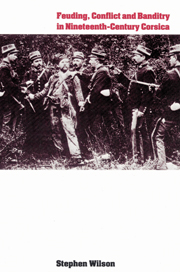Book contents
- Frontmatter
- Contents
- LIST OF ILLUSTRATIONS
- ACKNOWLEDGEMENTS
- 1 Corsica in the nineteenth century
- 2 The history and incidence of feuds
- 3 Conflict and its causes: conflicts of material interest
- 4 Conflict and its causes: conflicts of honour
- 5 Conflict and its causes: intrafamilial conflict
- 6 Conflict and its causes: inter-community conflict
- 7 Obligation and organization in the feud
- 8 Immunity and disruption
- 9 Conciliation and peacemaking
- 10 Feuding and the courts
- 11 Patronage and political conflict I
- 12 Banditry
- 13 Death and the dead
- 14 Conclusion
- APPENDICES
- LIST OF ABBREVIATIONS
- NOTES
- SOURCES AND BIBLIOGRAPHY
- INDEX
3 - Conflict and its causes: conflicts of material interest
Published online by Cambridge University Press: 06 July 2010
- Frontmatter
- Contents
- LIST OF ILLUSTRATIONS
- ACKNOWLEDGEMENTS
- 1 Corsica in the nineteenth century
- 2 The history and incidence of feuds
- 3 Conflict and its causes: conflicts of material interest
- 4 Conflict and its causes: conflicts of honour
- 5 Conflict and its causes: intrafamilial conflict
- 6 Conflict and its causes: inter-community conflict
- 7 Obligation and organization in the feud
- 8 Immunity and disruption
- 9 Conciliation and peacemaking
- 10 Feuding and the courts
- 11 Patronage and political conflict I
- 12 Banditry
- 13 Death and the dead
- 14 Conclusion
- APPENDICES
- LIST OF ABBREVIATIONS
- NOTES
- SOURCES AND BIBLIOGRAPHY
- INDEX
Summary
We turn now therefore to a consideration of conflict generally in nineteenth-century Corsica, of which feuding was only a part. Here we will distinguish conflicts of material interest, conflicts of honour, intrafamilial and inter-community conflict.
Writing in 1841, Léon Griffon, a former teacher at the college of Calvi, isolated the unremitting pursuit of material interest as a particular Corsican trait, linking it to the island's poverty and lack of natural resources: ‘Corsicans need to practise the strictest economy … and they have thus become sordidly materialistic to the point that they will never agree to anything unless they see an advantage in it for themselves.’ Other observers shared this view and pointed to the intense competitiveness which reigned at all levels of Corsican society. Again and again, trial summaries make the point that conflicts arose from ‘reasons of interest’ or ‘differences of interest’, and causing deliberate damage was probably the commonest form of offence against property all through the nineteenth century. As we have seen, moreover, attacks on material resources were part and parcel of feuding. ‘How many affronts were inflicted on you!’, a wife told her dead husband in a lament. ‘Walls pulled down, / Grange set on fire, / Trees cut down … / Then they killed your oxen / Asleep in the straw; / Alas, it was on that day … / [that you said] “I have had enough. / The blood of my oxen / Will be avenged”’.
- Type
- Chapter
- Information
- Publisher: Cambridge University PressPrint publication year: 1988

